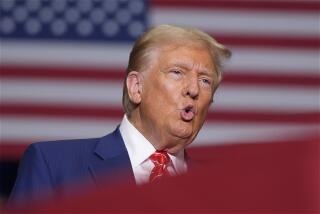Western Powers Remain Split Over Aid to the Soviets : Strategy: U.S. and allies risk squandering billions and a chance to gain long-sought political concessions.
As the United States and its major economic allies approach a key decision point on how to respond to the worsening economic situation in the Soviet Union, they find themselves sharply divided over what course to follow.
Unless they can unite behind a single strategy--and do it quickly--the Western governments risk squandering billions of dollars and missing perhaps their best opportunity to wrest long-desired political concessions from the Soviets.
Perhaps most important, if they remain in disarray, they may find themselves inadvertently strengthening the hand of the hard-liners in the Soviet Union who most oppose the reforms needed to transform the Soviet Union into a democracy and a market-oriented economy.
If there is anything on which the Western powers agree, it is that this painful process is the Soviet Union’s only hope.
While the Bush Administration is urging caution and a “step-by-step” approach tied to Soviet reforms, some of its European allies are moving ahead with their own aid programs. And Japan, which may be in the best position to provide aid, is staying aloof from the entire debate.
“Now the West is dissipating its energies, not to mention its money,” says Robert D. Hormats, vice chairman of Goldman Sachs International and former assistant secretary of state for international economic affairs.
“If the countries trip all over each other on the question of aid to the Soviet Union, we will lose any possible influence that we have,” Hormats says.
Top economic policy-makers of the world’s leading industrial powers will consider the aid question on Sunday, when the so-called Group of Seven holds a hastily arranged meeting in London.
The session--to include finance ministers and central bankers from the United States, Germany, Japan, Britain, France, Canada and Italy--will be struggling to smooth the way for next month’s seven-nation economic summit. After the summit, the respective heads of the seven governments plan to meet with Soviet President Mikhail S. Gorbachev.
The Bush Administration so far has held firm to the position that the Soviets should expect no massive aid. It also has warned that any assistance will be conditioned on the Soviets proving their commitment to economic reform.
But as a start to helping the Soviets, President Bush recently granted Gorbachev’s request for $1.5 billion in additional food credits.
In a speech on Tuesday, Secretary of State James A. Baker III repeated that the United States would join any Soviet reform effort “step by step.” The initial steps, he said, could include giving the Soviets access to the expertise--but not the money--of the World Bank and International Monetary Fund, helping them to restore the oil production that represents their best hope for income and working with them to improve the distribution system of food to now-bare grocery shelves.
But that approach came under harsh attack Wednesday from a group of U.S. and Soviet academics who have devised a much-publicized plan of their own, one they dubbed the “Grand Bargain.”
“Small aid can only support small reform. Small reform won’t work,” Harvard University economist Jeffrey Sachs, an architect of the plan, told a Senate Foreign Relations subcommittee. “Please don’t pretend that sending experts to one sector or another is what we’re about.”
The project--led by Harvard’s Graham Allison and Soviet economist Gregory Yavlinsky, former deputy prime minister of the Russian Federation--envisions Western countries committing as much as $130 billion over the next three years. The direct contribution from the United States would amount to about $3 billion a year.
In exchange for the Western aid, the Soviets next year would begin loosening the government’s grip on prices and trade, privatizing small businesses and imposing budgetary and monetary discipline. After about 2 1/2 years, the Soviets would turn to more ambitious reforms, such as giving the ruble meaningful purchasing power, total price decontrol and devising a capitalistic infrastructure to accommodate the new system.
Although only broad outlines of the plan have been disclosed, it is winning praise in some U.S. circles. But critics say it amounts to bribing the Soviets to do what is in their own best interest.
Others say that any aid would be wasted until basic reforms are in place. “Substantial sums of direct aid to today’s Soviet Union would be like pouring money into a cosmic black hole,” Sen. Sam Nunn (D-Ga.) said.
And politicians can ill afford to waste money on this country’s long-time nemesis when they face pressing economic needs at home. “Politically, there’s no way that approach is going to work around here,” said John P. Hardt, a senior specialist in Soviet economics at the Library of Congress.
Others argue that massive aid to the Soviets would sap resources that might otherwise be funneled to the struggling countries in Eastern Europe, which are further along and more committed to economic reform.
Some Western allies, however, are not as leery. France, Germany and Italy appear eager to begin providing large amounts of aid to Moscow. And the 12-nation European Community last December announced its intention to provide the equivalent of $1.3 billion in food aid and technical assistance.
The European Community “is much more inclined to move forward without as much conditionality,” Hardt said, adding that this reflects fears that further weakening of the Soviet Union might mean political instability, a flood of immigrants across Europe and a failure by the Soviets to remove their remaining troops from Germany.
Japan, with its booming economy, might seem in the best position to come to the rescue, but it is proving, if anything, even more reluctant than the United States.
In large measure, this reflects longstanding animosities between Japan and the Soviets that have yet to thaw. When Gorbachev went to Tokyo in April to plead for aid and investment, Japan reportedly was ready to ante up as much as $28 billion. But the talks broke down over Soviet refusal to return four islands seized by the Stalin regime after World War II. Gorbachev went home with nothing.
Whether to require such political concessions of the Soviets could become a major part of the debate over aid.
What the West Wants Soviets to Do
* Honor commitments to democracy and decentralization. Seek a division of political authority acceptable to republics that choose to stay in Soviet Union.
* Raise consumer prices now to relieve chronic shortages and reduce ballooning budget deficits.
* End price controls and ration limited quantities of consumer staples at heavily subsidized prices.
* Speed privatization of small businesses to substitute for collapsing state enterprises.
* Subdue inflation by cutting subsidies and preventing state banks from printing money to cover deficits of state enterprises.
* Make the ruble freely convertible into foreign currencies and give Soviet enterprises a chance to compete in global markets.
* Have state banks offer loans at competitive interest rates to public and private enterprises.
More to Read
Sign up for Essential California
The most important California stories and recommendations in your inbox every morning.
You may occasionally receive promotional content from the Los Angeles Times.






